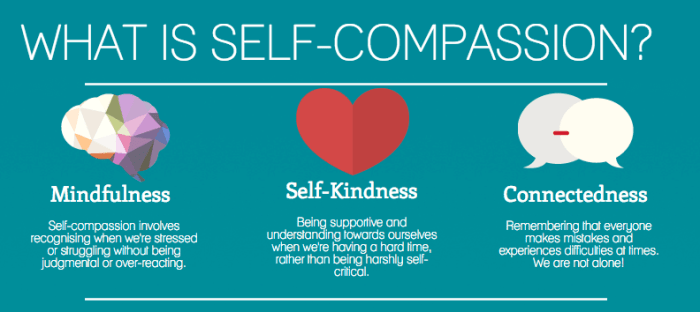How to Meditate for Achieving True Self-Compassion sets the stage for this enthralling narrative, offering readers a glimpse into a story that is rich in detail with creatively persuasive style and brimming with originality from the outset.
Embark on a journey of self-discovery and compassion through the art of meditation. Dive deep into the realm of mindfulness and inner peace as we explore the transformative power of self-compassion meditation.
Introduction to Self-Compassion Meditation

Self-compassion is the practice of treating oneself with kindness, understanding, and acceptance, especially in times of struggle or failure. It involves being mindful of one’s own emotions and experiences without judgment. Self-compassion plays a crucial role in mental well-being as it helps individuals develop a sense of inner peace, resilience, and emotional strength.Meditation serves as a powerful tool for cultivating self-compassion by allowing individuals to connect with their inner selves, acknowledge their thoughts and feelings, and cultivate a sense of self-awareness.
For those seeking a comprehensive approach to meditation, The Ultimate Guide to Meditation: 20 Tips and Tricks offers valuable insights and practical techniques. From breathing exercises to visualization, this guide covers all aspects of meditation to help us achieve inner peace and clarity.
Through meditation, individuals can learn to be more compassionate towards themselves, let go of self-criticism, and develop a more positive and nurturing relationship with themselves.
Emotional balance and stability are essential for our overall well-being. Through meditation, we can achieve this by following the guidance provided in How to Meditate for Emotional Balance and Stability. By cultivating mindfulness and awareness, we can navigate our emotions with grace and composure.
The Benefits of Practicing Self-Compassion Meditation
- Enhanced Emotional Resilience: Self-compassion meditation helps individuals build emotional resilience by teaching them to respond to their own suffering with kindness and understanding.
- Reduced Stress and Anxiety: Regular practice of self-compassion meditation can reduce stress and anxiety levels by promoting a sense of calmness and relaxation.
- Improved Self-Esteem: By fostering self-compassion through meditation, individuals can boost their self-esteem and develop a more positive self-image.
- Increased Empathy and Connection: Self-compassion meditation can enhance empathy towards others and improve interpersonal relationships by fostering a sense of connection and understanding.
Understanding the Basics of Meditation

Meditation is a powerful tool for cultivating self-compassion and fostering a deeper connection with oneself. By understanding the basics of meditation, we can tap into its potential to enhance our sense of self-worth and kindness towards ourselves.
Different Meditation Techniques for Self-Compassion
- Loving-Kindness Meditation: This practice involves extending feelings of love and compassion towards oneself and others. By repeating phrases like “May I be happy, may I be safe, may I be healthy, may I live with ease,” we can cultivate a sense of self-compassion.
- Body Scan Meditation: This technique involves focusing on different parts of the body and noticing any tension or discomfort. By bringing awareness to our physical sensations without judgment, we can develop compassion towards our bodies.
- Breath Awareness Meditation: Focusing on the breath can help us stay present in the moment and calm our minds. By practicing mindful breathing, we can create a sense of inner peace and self-compassion.
Role of Mindfulness in Self-Compassion Meditation
Mindfulness plays a crucial role in self-compassion meditation by helping us stay present and non-judgmental towards our thoughts and emotions. By cultivating mindfulness, we can observe our inner experiences with compassion and kindness, rather than reacting to them with self-criticism.
As we embark on the journey of exploring our inner selves, meditation plays a crucial role in enhancing creativity. By practicing the techniques outlined in How to Meditate for Creativity: 6 Essential Techniques , we can unlock our creative potential and tap into new ideas and inspiration.
Tips for Creating a Conducive Environment for Meditation Practice
- Choose a Quiet Space: Find a peaceful and quiet environment where you can practice meditation without distractions.
- Set a Regular Schedule: Establish a daily meditation routine to make it a habit and prioritize self-compassion in your daily life.
- Use Cushions or Chairs: Sit in a comfortable position that allows you to relax and focus on your meditation practice without discomfort.
- Eliminate Distractions: Turn off your phone, computer, or any other devices that may interrupt your meditation session.
- Practice Gratitude: Start and end your meditation sessions with a sense of gratitude towards yourself for taking the time to cultivate self-compassion.
Steps to Meditate for Achieving True Self-Compassion

Meditating for self-compassion involves a deliberate practice of kindness and understanding towards oneself. By following these steps, you can cultivate a sense of empathy and compassion within.
Breathing Exercises to Enhance Self-Compassion
- Begin by finding a comfortable seated position, with your back straight and shoulders relaxed.
- Close your eyes and take a few deep breaths, focusing on the sensation of air entering and leaving your body.
- As you continue to breathe, imagine inhaling feelings of love and compassion, and exhaling any self-criticism or negativity.
- With each breath, feel a sense of warmth and kindness filling your heart and mind.
- Repeat this process for a few minutes, allowing yourself to fully embrace the feelings of self-compassion that arise.
Setting Intentions Before Each Meditation Session, How to Meditate for Achieving True Self-Compassion
Setting intentions before meditating can help guide your practice and focus your mind on cultivating self-compassion. Consider the following steps:
- Take a moment to reflect on what you hope to achieve during this meditation session.
- Set a positive intention, such as “May I be kind to myself” or “May I cultivate self-compassion and understanding.”
- Repeat this intention silently to yourself as you begin your practice, allowing it to guide your thoughts and emotions.
- By setting clear intentions, you can create a more meaningful and transformative meditation experience focused on self-compassion.
Overcoming Challenges in Self-Compassion Meditation: How To Meditate For Achieving True Self-Compassion

Self-compassion meditation can be a powerful tool for cultivating kindness and understanding towards oneself. However, like any form of meditation, it comes with its own set of challenges. Here are some common obstacles faced during self-compassion meditation and strategies to overcome them:
Dealing with Distractions
Distractions are a common challenge during meditation, especially when trying to focus on self-compassion. Here are some strategies to help you stay present and focused:
- Acknowledge distractions without judgment and gently bring your focus back to your breath or mantra.
- Use physical sensations, such as the feeling of your breath or the sensation of your body on the chair, as anchors to bring you back to the present moment.
- If distractions persist, try labeling them as “thoughts” or “feelings” before returning to your point of focus.
Handling Negative Emotions
During self-compassion meditation, it is common for negative emotions to arise. Here are some tips for dealing with them:
- Practice self-compassion by acknowledging and accepting your emotions without judgment.
- Remind yourself that it is natural to experience a range of emotions during meditation and that it is part of the process of healing and growth.
- Use loving-kindness phrases or mantras to cultivate feelings of compassion and kindness towards yourself, especially when negative emotions surface.
As we conclude our exploration of meditation for true self-compassion, remember that the path to inner peace is within reach. Embrace the practice, cultivate self-compassion, and watch as your true essence shines through with each mindful breath.